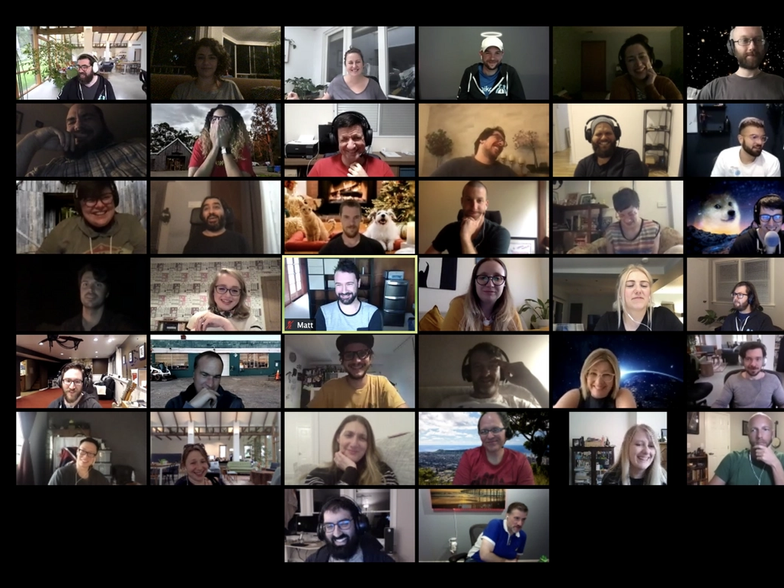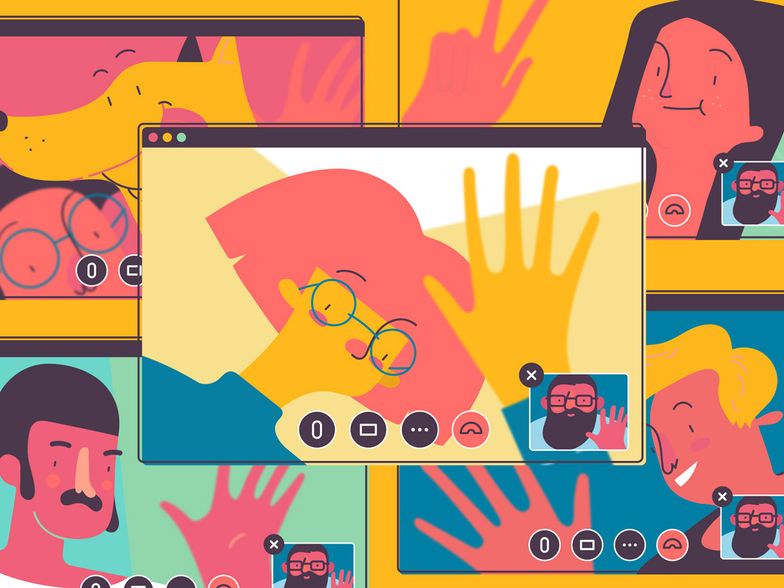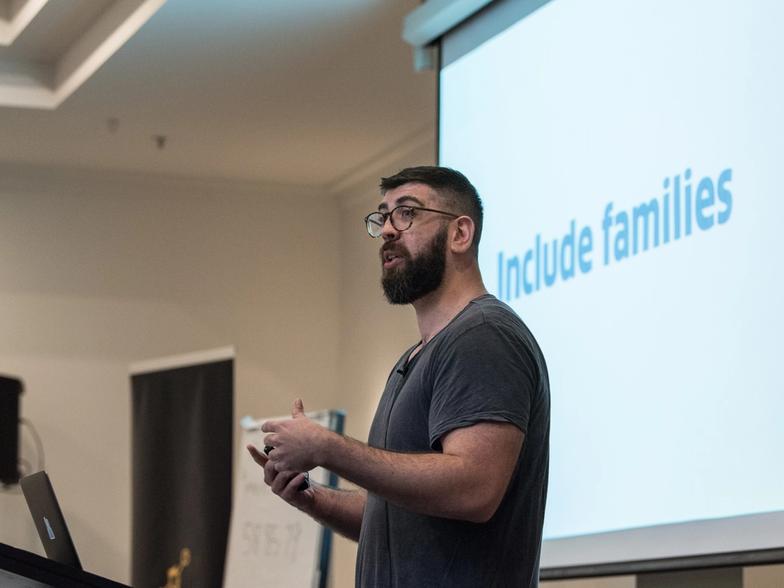Working from home is no longer a job perk only offered by a handful of companies. Now, all of a sudden, remote work is a necessity across nearly every industry (at least to some degree).
This new way of working comes with some unique challenges for healthcare businesses, and clinics everywhere are trying to adjust. But fortunately, there are ways you can make working from home go a little smoother for yourself, your practice, and your team.
At Cliniko, we know quite a bit about this stuff. We’ve been a remote company since our founding nearly a decade ago, and we’ve learned a lot of lessons over the years.
To be fair, our founder, Joel, wasn’t too keen on the idea of remote work when he posted Cliniko’s first-ever job opening. But a creative and persistent web developer in Poland convinced him to give it a shot. His name is Bartosz, and we’re all so grateful he convinced Joel to take a chance.
And now, almost ten years later, I’ll share some insight into how we operate and the adjustments we’ve made during this pandemic. Hopefully, you can find a helpful nugget or two that might improve the way your clinic operates with some (or all) of your team working from home.
Not everything we do can be directly applied to your practice, but with a little tweaking and personalisation, you could create a substantial positive impact on your team and your business.
Let's dive right in with one of my favourite things about working at Cliniko!
We don't have meetings.
That's right. No meetings. We don't need them.
If there's something important to say, it gets posted on our messaging platform for all to see. If anyone has questions about it, they can post them in the thread, and we'll answer them together as a team. And we do it all—brace yourself for the buzz word here—asynchronously.
Asynchronous meetings have the same benefits as scheduled, synchronous meetings (in person or video chat), but with the added freedom for people to get the information they need on their own time.
We've got team members spread all over the world, so a scheduled meeting isn't feasible for us. There are just too many time zones to accommodate.
We also have a lot of parents on our team, and getting our kids to stop screaming like banshees for an entire 30-minute meeting is far from realistic.
But these aren't the main reasons we avoid meetings. The truth is, most meetings are a pointless distraction from productive work.
Seriously. Think about how many times you've left a meeting mumbling under your breath, 'That could've all been said in an email'. Yeah, I've been there too.
More importantly, Joel (our founder) also experienced this during his corporate career before starting Cliniko. He knew how valuable people's time was, as well as the toll most meetings took on their productivity and creativity.
So he decided early on that he would do things differently, and it's been working since the start (with a few bumps along the way, of course).
Instead of meetings, we use Slack for all of our internal communications.
Anything important that needs to be shared gets posted in Slack, along with documents, videos, and the regular day-to-day chatter that makes working with a team so much fun (you know, like an obscene amount of GIFs).
We use different 'channels' for various topics where we can post messages and chat in real-time or respond later, like an email. If ever we decide that a face-to-face conversation is the most effective choice, we'll use the built-in video call feature.
That almost never happens, but on the rare occasion it does, we set our own time and our own topic. Meetings are our choice, not our obligation.
You know the time it usually takes for everyone to get settled into a meeting and sitting through the rambling intro that comes before the one bit of info you’re actually interested in? Yeah, we don't have that.
Discussions are direct, informative, and usually pretty quick. Why? Because everyone is already up to speed on everything they need to know.
With all of our communications contained on one platform and the topics compartmentalised in various channels, it’s easy to stay up to date and jump into discussions.
And if there’s ever something we don’t know, we just search through the archives and find what we’re looking for. If we can’t find it, we’ll ask the group, and someone will usually respond with the info we need in just a few minutes.
Then it’s right back to work, with only a limited interruption. Try getting that from a typical, scheduled meeting.
I can’t overstate the effect this freedom has on us during the pandemic. Without meetings, we’re able to keep our schedules nimble enough to juggle both our work and personal responsibilities. We’re happier and less stressed than we probably would be otherwise.
How can your practice become meetings-free?
If your clinic is already using Cliniko, then I hope you're taking advantage of the internal message board. This can be your primary hub for sharing important information with your team. This is also a good place for them to post questions that you (or anyone else on the team) can answer.
Yes, Slack has been a great tool for us. But that doesn't necessarily mean it will work well for you. Everyone has different requirements. If you’re interested in exploring your options, take a look at some user reviews for other collaboration tools, and maybe you'll find another one that suits your needs better.
And if you're not comfortable making a new software investment right now, there are plenty of other ways you can create the processes you need. All it takes is a little creative thinking.
As an example, try sending out an email with all the info you want to share with your team and ask people to 'reply all' with their questions or comments. That way you'll have a dedicated thread for that discussion, and everyone can look back to it as a reference (just like we do with Slack).
And if you’d like to add a bit of a personal touch, share the info in a video instead of writing it out. That might be a fun way to add some needed flare or motivation. Either way, the process is the same.
Be careful: If you’re sharing any patient data or personally identifiable information, you’ll need to verify that any software you use complies with the privacy laws of your country.
We have flexible work times.
We don't clock in. There's no manager checking to see if we're online and doing our jobs. And with schools closed during a lockdown, it’s easy to step away when we need to break up our kids' pillow fight in the other room (or get one started).
Sometimes I’ll hop online early in the morning to knock out a few tasks before the baby wakes up. Then I can spend my morning with him and get back to work in the afternoon or evening.
And if something unexpected happens—like recently, when my little guy got stung by a wasp—I can stop what I’m doing and give him the care he needs.
There has been a lot of research on this, and the science is clear: flexible working arrangements (FWAs) have a direct positive effect on people's productivity, attitude, commitment, and overall job satisfaction. FWAs include things like flexible hours, telecommuting, compressed workweeks, etc.
If you allow your team to work around their personal needs, they'll likely get more high quality work done and will feel better about their role on the team. Even if it's just a little flex time on when they start or stop for the day, that can make all the difference.
Just imagine what some wiggle room might mean for a parent or someone who’s caring for an elderly family member.
Basically, just be patient and trust your team to do their jobs well on whatever schedule works best for them. You might wind up quite pleased with the results.
How can your clinic use flexible work times?
First things first, take a moment to remind yourself of a basic fact that is sometimes easily overlooked: your team is made of real people who have lives, families, and responsibilities that are sometimes a higher priority than work. That’s especially true now during the pandemic.
Being mindful of this and setting your expectations accordingly can have a powerful impact on helping your team feel valued and respected. And that has a direct effect on the quality of their work and their willingness to go the extra mile.
Certain roles need to have a set schedule. It's unavoidable. Our support team, for example, has an established weekly schedule to make sure there are always enough people available to answer incoming help requests.
But they still have some flexibility. If they need a little leeway before they're ready to start working, they'll just post a message in Slack to let everyone know that they're running a little late. No biggie.
Or if they've got a pounding headache that's getting in the way of their work, they'll let everyone know what's going on and that they'll be back after a 20-minute break. It's not a problem.
Maybe something similar could work with your team while they are working from home.
You probably have set hours for certain things like client calls or maybe even a remote way to keep the appointments flowing smoothly. But for other tasks like bookkeeping and paperwork, there might be some space to be flexible. After all, if they’re working from home, they can finish up the administrative stuff in the evenings or over the weekend.
There's almost always room for flexibility in the schedule if you want there to be. All it takes is a little teamwork and trust. And the results could be astounding.
Lower productivity is okay.
It's important to be realistic. There's nothing normal about living in a lockdown situation. Simple things like grocery shopping or getting some exercise require extra effort and usually come with added stress. It all takes an emotional toll, and over time, it can begin to weigh heavy on our minds.
At Cliniko, we’re fortunate to have a forward-thinking founder who recognised this early on in the pandemic. When the lockdowns first started, Joel told the team to continue doing our best but that he expected a decrease in the amount of work we accomplished. And—more importantly—that he was okay with it.
He let us know that we should focus on our families when they need us and to not place any unnecessary stress on ourselves. The work would still be waiting for us when we were ready.
Depending on your perspective, that might seem like a small gesture or an outlandish way of running a company. But I can tell you, it was powerful and had a significant impact on the team. Even as I read the message in Slack, I could sense the collective sigh of relief we all shared. It was exactly what we needed to hear.
And guess what? Our productivity is doing just fine. Some weeks are better than others, but there certainly hasn't been a major drop in the amount of work we're producing.
Actually, in the early days of the pandemic, some of our team worked night and day to crank out new features and help practitioners get the support they needed. We were actually much more productive during this time, and it was a direct result of being shown the trust and patience we needed.
Being nice is good for business.
Joel is a kind person. That’s part of the reason he was okay with a little less productivity. But it’s not the only reason. Being nice can also have a direct effect on the bottom line.
Helping your team during tough times shows that you see them as people, not just employees. It allows them to form an emotional connection with your business and creates lasting loyalty. In other words, it helps keep your turnover low.
With that in mind, think about how much it would cost to keep someone on your team. Any idea? Nothing. Zero. Beyond their salary and benefits, there is no additional expense for holding onto a team member.
On the other hand, how much would it cost to lose someone? How much revenue would leave with them? And how much would you spend to recruit and hire a replacement? It’s probably more than you think. A lot more.
Take a look at this custom calculator we created to see just how much you might save by being nice.
How can you be patient with a little less productivity?
It's all about prioritising what matters most. Certain things have to get done. There's no question of how important they are, and their completion should remain non-negotiable.
But take a step back and consider just how crucial other tasks are. Are they important, or do they just feel that way?
If it helps, ask yourself a question: 'What if this didn't get done on time (or at all)? What's the worst-case scenario?'
Be honest with your response. If it would have a negative impact on your business, then it's probably worth placing near the top of your to-do list. But if not, maybe it’s not as important as you thought.
To take things one step further, ask yourself the opposite question: 'What's the benefit of this getting done on time (or at all)? What's the best-case scenario from getting it accomplished?
Honesty is essential here, as well. Don't add substance to something just because it suits your preferences. Tell yourself the truth. You just might discover that some of the things you thought were important, don't actually affect your business very much at all.
You can also take some proactive steps to help your staff feel a little less pressure. You might consider requiring patients to give additional notice for cancelled appointments, for example.
That way, instead of your team being forced to quickly handle a last-minute cancellation, they can have a 24 or 48 hours heads-up to get the time slot filled and keep the day’s appointments flowing smoothly.
If nothing else, it might be worth taking some time to think about your key performance indicators (KPIs) and what your business might look like if you reduced them temporarily.
Does this all sound crazy?
No meetings. No set schedules. And lower productivity. That would never work for your practice, right?
I don’t know. Maybe it wouldn’t. But you’ll never know if you don’t give it a shot. With the future of this pandemic so uncertain, it might be worth exploring the ways you can help your team adapt and cope with it all.
Just don’t be too hard on yourself. You deserve some patience and flexibility too. If you try something new and it doesn’t work, you’ve always got the option to tweak it or go back to the drawing board.
But if you never attempt an improvement, you’ll never know how much better things might have been for you, your team, and your business.



